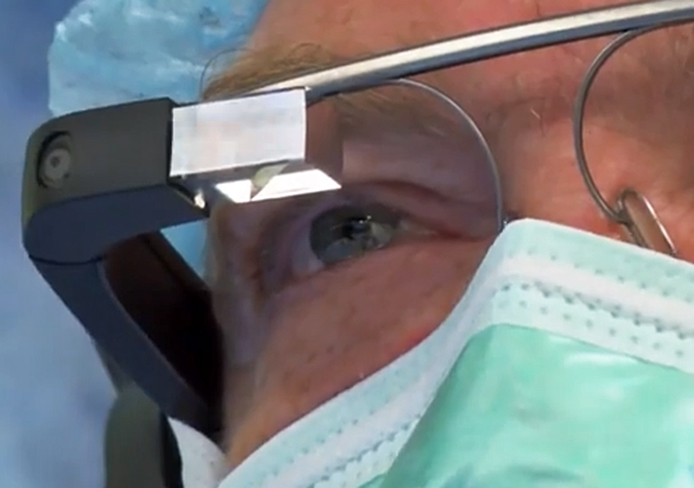
Dr. Christopher Kaeding, an orthopedic physician and professor in the Department of Orthopaedics, performing an ACL surgery wearing Google Glass Aug. 21 at the Wexner Medical Center.
Credit: Courtesy of YouTube
Imagine watching a doctor perform a surgery in real-time while in class. Now picture viewing the surgery from the doctor’s perspective.
An ACL surgery at the Wexner Medical Center was streamed using Google Glass to a class of medical students and a colleague Aug. 21.
“The idea of having this head-mounted gateway to a network, with both auditory and visual two-way communication that’s hands-free, it’s pretty neat stuff,” said Dr. Christopher Kaeding, an orthopedic physician and professor in the Department of Orthopaedics, who performed the surgery.
Google Glass is a hands-free wearable computer that is voice-activated and has similar capabilities to a smartphone, such as a camera, talk and Internet access. It uses an optical head-mounted display with a small display screen that can reflect images but can also be transparent, which is placed in front of one eye. It is built like a pair of glasses without the lenses.
In a Google Hangout, a video chat conference, Kaeding used Google Glass to speak with and receive feedback from a colleague during the procedure. He also narrated his step-by-step actions, so the students watching via the live stream could follow what he was doing.
Kaeding said Google Glass wasn’t distracting and the surgery itself was the same, but he had to adjust to physically wearing the headpiece.
“(Wearing Google Glass) felt a little odd initially, but by the end of the surgery I could see how you could get very used to it,” he said.
Google Glass is not currently on sale to the public, but Dr. Ismail Nabeel, assistant professor of general internal medicine, was selected as one of 8,000 people in the world to test Glass as part of Google’s “Explorer Program,” which was a contest where applicants had to submit a brief essay or video and pictures about how they would use Google Glass and share it via social media with the hashtag #ifihadglass, Nabeel said. He paid the $1,500 cost for the single pair himself.
Other Google Explorers are trying out medical uses of the technology as well. A hospital in India live streamed a hernia repair Tuesday, and an optometry student in Michigan has been using it for her senior research project and lending it out to other students at her optometry school. Some Explorers are developers helping Google create Glass apps and further the technology, while still others are documenting their everyday life, like a stay-at-home mom in New York City who uses Glass to take and send pictures of her 9-month-old baby to family members.
Nabeel said he and his colleagues came up with the idea of using it in surgery because they felt “that could really demonstrate the capabilities of Glass.” But before the surgery, Nabeel said there were many considerations to make, including finding a patient who was comfortable with the idea, technicalities such as ensuring the battery did not run out and choosing the right doctor.
Nabeel said Kaeding was “very interested and curious about how we could do this” and was “very comfortable with Glass.”
Nabeel said he thinks Google Glass could potentially have many beneficial medical uses, such as streaming x-rays or other information to a doctor while in surgery, or providing up-close lessons for medical students.
Anirudh Damughatla, a third-year in biomedical engineering who plans to attend medical school, said the use of Google Glass in surgery could be a “great step forward” for education.
“I went and shadowed doctors, and it’s really different seeing it with your own eyes,“ he said. “But it would be another thing completely to see it from the doctor’s actual perspective.”
Nabeel also said he realizes there are drawbacks to Google Glass, such as the placement of the camera and the way it gives a limited view to someone watching the live stream. He said the well-being of the patient should always be the No. 1 concern.
“Technology is great … but you need to understand the other side where it can be a dangerous thing,” he said. “I ask myself, ‘Am I improving patient care?’ If that question I can answer, then I can go forward with it.”
Kaeding said he did not notice any significant drawbacks to using Google Glass during surgery, and he would do another surgery using it in the future.
Nabeel said future uses of Google Glass at the Medical Center could eventually be in the works.
“Time will tell, in the sense of if it really, effectively will help make life better for our patients,” Nabeel said. “And I think it has the potential to do it.”
Google was not able to immediately provide comment Tuesday night.


